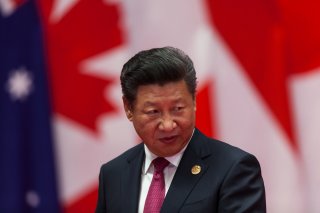China’s Missed Opportunity in Israel
Beijing’s relative absence in the Israel-Hamas conflict may stymie its ambitions in the region.
Israel does not expect Beijing to resolve the longstanding conflict with Hamas. Still, it would like China to demonstrate more support, and it hopes Beijing could use its power to weigh and influence some Middle Eastern allies as well. Israeli Ambassador Irit Ben-Abba called on Beijing to leverage its close relationship with Iran to rein in Hamas by engaging in talks around the conflict. “We really hope China can be much more involved in talking to its close partners in the Middle East and particularly Iran.”
The Hamas-Israel conflict may also hit Beijing’s relationship with Jerusalem and the broader Middle East. China has long tried to adopt a balanced position by supporting Palestinian statehood while maintaining strong economic and diplomatic ties with Israel. Beijing has reasons to balance its relationships on both sides of the conflict, with its bilateral trade with Israel totaling some $21 billion last year, and more than half of its exports to China are electric components, including microchips. This trade with Israel is crucial as the United States urges its partners to limit the sale of semiconductor technology to Beijing. While Washington provided Jerusalem with sympathy and practical support and is sending aircraft carriers to the region to prevent Iran and Hezbollah from escalating, China’s lax response can have an immediate and long-term price. For example, Israeli Prime Minister Netanyahu’s planned official visit to China probably did not materialize, and the two parties will not likely conclude an FTA, which has been under discussion for several years.
More importantly, the intensifying great power rivalry created a highly precarious situation for future Sino-Israeli ties. Israel faces a complex geopolitical and commercial calculus, with new pressures on managing its national security and economic development. This complicates its efforts to maintain hedging behavior within certain limitations and forces it to choose between keeping the U.S. security partnership or strengthening its economic and technological collaboration with Beijing. Washington expects Israel, its closest ally in the region, to align with its strategic interests and positions in rivalry with China. The special relationship between Israel and the United States is rooted in shared values and deep and practical cooperation in every field, from military and security to diplomacy and commerce. In times of need, true friends reveal themselves through their actions. The Hamas-Israel conflict can serve as a lesson to countries in the Middle East thinking through their relationship with China.
Dr. Mordechai Chaziza is a senior lecturer at the Department of Politics and Governance and the Multidisciplinary Studies in Social Science division at Ashkelon Academic College (Israel) and a Research Fellow at the Asian Studies Department, University of Haifa, specializing in Chinese foreign and strategic relations.
Image: Shutterstock.

